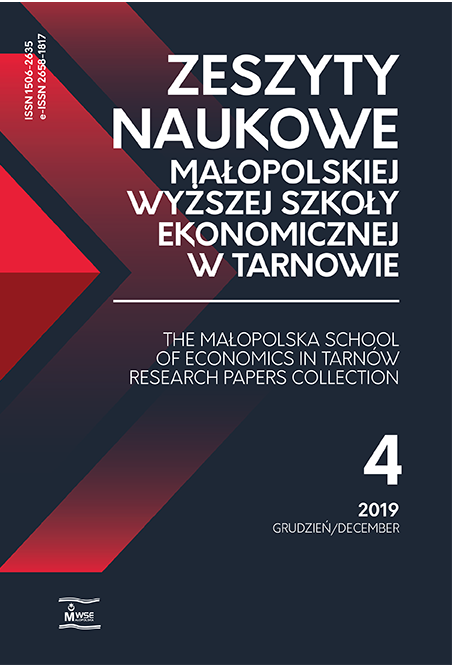Abstract
The size and stability of VAT revenues is extremely important for conducting financial policy. European countries take various initiatives, due to the overall amount of tax fraud. The purpose of the discussion conducted in the article is to analyze the essence of the split payment mechanism (SPM) as an instrument to combat tax fraud and evaluate it from the point of view of: construction of tax regulations and benefits in connection with its use by business units and from the perspective of the small and medium-sized enterprises. The article uses a critical analysis of legal acts and the method of structured interviews with owners of small and medium enterprises. The conclusion of these considerations is that SPM is negatively assessed by most of the units surveyed and causes practical problems in their functioning. Solutions that the legislator can introduce to make the split payment mechanism more attractive for Polish entrepreneurs were presented. In November 2019, a mandatory split payment for selected goods and services will be introduced, and so far the VAT amendment causes problems with financial fluidity of enterprises. It also turns out that the tax incentives proposed by the legislator are not adequate in relation to the problems encountered when performing split payment operations. The experiences of other European countries in combating tax fraud by introducing SPM were recalled. Further analysis of the effectiveness of this solution should take into account its impact on the functioning and financial fluidity of enterprises.
References
Bartosiewicz, A. (2018). Split payment – podzielona płatność. Pytania i odpowiedzi. Warszawa: Wolters Kluwer. ISBN 9788381248105.
View in Google Scholar
Brzozowska, K. (2018). Split payment 2018. Konsekwencje stosowania nowych regulacji w praktyce. Warszawa: Wiedza i Praktyka. ISBN 9788326977336.
View in Google Scholar
Chorzępa-Starosta, M. (2019). Obowiązkowy split payment w Polsce, od kiedy będzie obowiązkowy [online, accessed: 2019-07-28]. Biuletyn Euro Info, 4. Retrieved from: www.parp.gov.pl/component/content/article/57207:obowiazkowy-split-payment-w-polsce-od-kiedy-bedzie-obowiazkowy.
View in Google Scholar
Deloitte. (2017). Analysis of the impact of the split payment mechanism as an alternative VAT collection method: Final report. Executive summary. Luxembourg: Publications Office of the European Union. ISBN 9789279779862.
View in Google Scholar
European Commission. (2016). Communication from the Commission to the European Parliament, the Council and the European Economic and Social Committee on an action plan on VAT: Towards a single EU VAT area – Time to decide. Brussels: COM(2016) 148 final.
View in Google Scholar
EY. (2018). Split payment oczami przedsiębiorców. Raport z badania. Warszawa: EY.
View in Google Scholar
Guziejewska, B., Zajączkowski, W. (2018). VAT split payment jako nowe narzędzie uszczelniania systemu podatkowego w Polsce. Prace Naukowe Uniwersytetu Ekonomicznego we Wrocławiu, 532, 135–143 DOI: 10.15611/pn.2018.532.13.
View in Google Scholar
Kanar, A., Thackray, M. (2018). Poland. Revenue administration gap analysis program: The Value-Added Tax gap. Technical Assistance Report. IMF Country Report No. 18/357. Washington: International Monetary Fund.
View in Google Scholar
Maj, S. (2019). Obowiązkowy split payment dla niektórych firm [online, accessed: 2019-07-28]. Rzeczpospolita, 11414, H-008. Retrieved from: https://www.rp.pl/VAT/307249994-Obowiazkowy-split-paymentdla-niektorych-firm.html.
View in Google Scholar
Mitran, D. (2017). European trends in split VAT. Internal Auditing and Risk Management, 48(4), 43–50.
View in Google Scholar
Neal, L. (2007). The economics of Europe and the European Union. Cambridge: Cambridge University Press. ISBN 9780521683012.
View in Google Scholar
NIK. (2018). Przeciwdziałanie wyłudzeniom podatku VAT: informacja o wynikach kontroli. Warszawa: Najwyższa Izba Kontroli, Departament Budżetu i Finansów. Registration number 23/2018/P/17/013/KBF.
View in Google Scholar
Otto, P. (2018). Split payment: przymusowa dobrowolność [online, accessed: 2019-07-28]. Dziennik Gazeta Prawna, 214 (4864). Retrieved from: https://edgp.gazetaprawna.pl/e-wydanie/55667,5-listopada--2018/65619,Dziennik-Gazeta-Prawna/674596,Split-payment:-przymusowa-dobrowolnosc.html.
View in Google Scholar
Prokop D. (ed.). Mechanizm podzielonej płatności split payment: tło, korzyści, zagrożenia. Warszawa: Wolters Kluwer. ISBN 9788381248440.
View in Google Scholar
PwC Polska. (2015). Split payment. Warszawa: PwC Polska.
View in Google Scholar
PwC Polska (2018). Jak zaprezentować split payment w sprawozdaniach finansowych? [online, accessed: 2019-07-22]. Warszawa: PwC Polska. Retrieved from: www.pwc.pl/pl/artykuly/2018/jak-zaprezentowacsplit-payment-w-sprawozdaniach-finansowych.html.]
View in Google Scholar
PwC Polska. (2019). Obowiązkowy split payment od listopada 2019 [online, accessed: 2019-07-31]. Warszawa: PwC Polska. Retrieved from: www.pwc.pl/pl/artykuly/nowosci-podatkowe/2019/2019-01-28-obowiazkowy-split-payment.html.
View in Google Scholar
Sarnowski, J., Selera P., et al. (2018). Zmniejszenie luki VAT w Polsce w latach 2016–2017: przyczyny – środki – dalsze perspektywy. Warszawa: Polski Instytut Ekonomiczny. Warszawa. ISBN 9788361284680.
View in Google Scholar
Szlęzak-Matusewicz, J. (2015). Odwrotne obciążenie VAT jako mechanizm przeciwdziałający oszustwom podatkowym. Finanse, Rynki Finansowe, Ubezpieczenia, 1(76), 265–275. DOI 10.18276/frfu.2015.76/1-23.
View in Google Scholar
Tratkiewicz, T. (2016). Luka w VAT – sposoby przeciwdziałania w Polsce i Unii Europejskiej. Studia Ekonomiczne. Zeszyty Naukowe Uniwersytetu Ekonomicznego w Katowicach, 294, 185–196.
View in Google Scholar
Tratkiewicz, T. (2017). Model podzielonej płatności – remedium na oszustwa w VAT? Annales Universitatis Mariae Curie-Skłodowska. Sectio H – Oeconomia, 51(6), 475–484. DOI: 10.17951/h.2017.51.6.475.
View in Google Scholar
Ustawa z dnia 15 grudnia 2017 r. o zmianie ustawy o podatku od towarów i usług oraz niektórych innych ustaw. Dz.U. z 2018 r., poz. 62.
View in Google Scholar
Węgielska, A. (2019). Obowiązkowy split payment od 1 września 2019 [online, accessed: 2019-07-31]. Portal Podatkowo-Księgowy Gofin.pl. Gorzów Wielkopolski: Wydawnictwo Podatkowe Gofin. Retrieved from: www.gofin.pl/podatki/17,2,62,189256,obowiazkowy-split-payment-od-1-wrzesnia-2019-r.html.
View in Google Scholar
© Copyright by Małopolska School of Economics in Tarnów. The articles are available under the Creative Commons Attribution NonCommercial-NoDerivatives 4.0 International License


